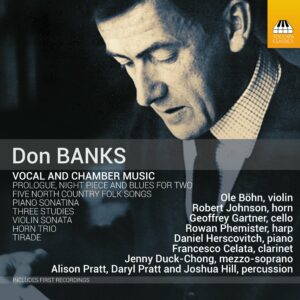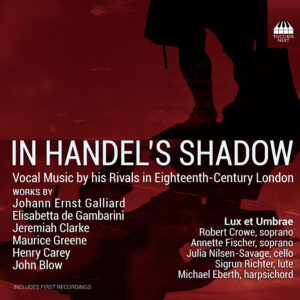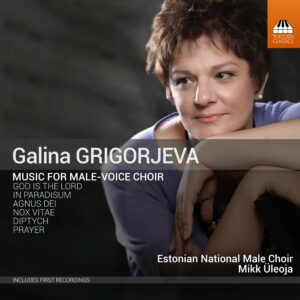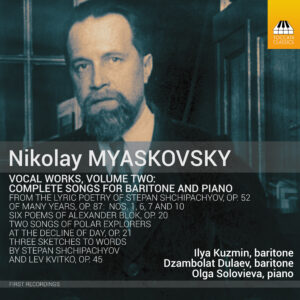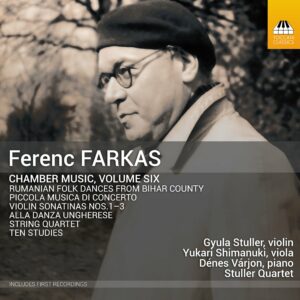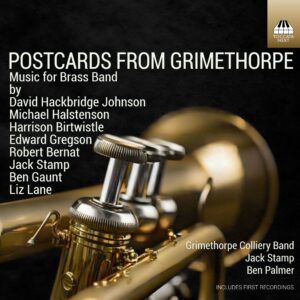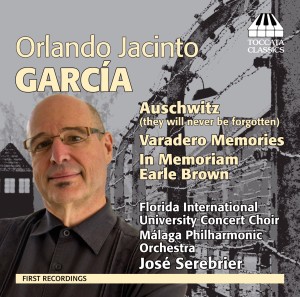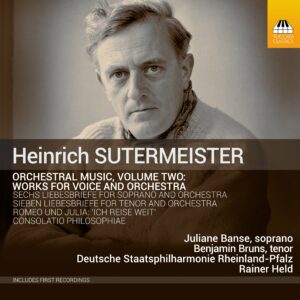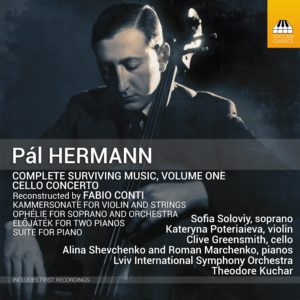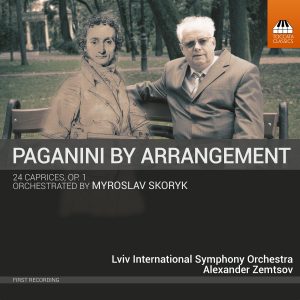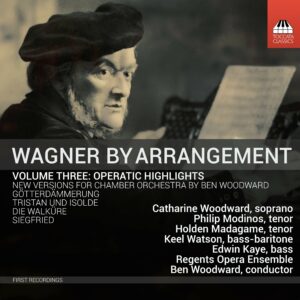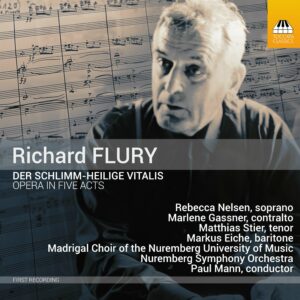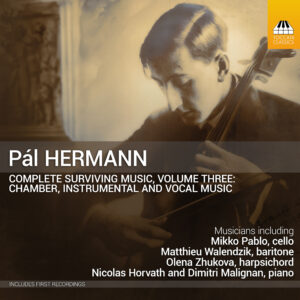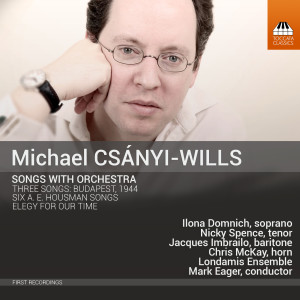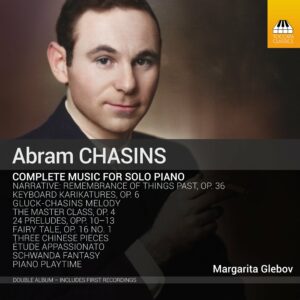Search Results for "1997 Bilbao International Vocal Competition winner Chinese tenor"
Showing results for 1997 bulb international vocal competition winner chinese tenor 1997 tenor 1997 1997 1997
Don Banks: Vocal and Chamber Music
During his short life Don Banks (1923–80) enjoyed a reputation as the leading modernist among Australian composers. Studies with Mátyás Seiber, Milton Babbitt and, especially, Luigi Dallapiccola helped refine his serial technique, but his music never retreated into academic abstraction, as this recital of chamber and vocal works demonstrates: it retained a keen sense of drama, an ear for atmosphere, a rather angular lyricism and, occasionally, a touch of humour.
Robert Johnson, horn (Tracks 1–3)
Ole Böhn, violin (Tracks 1–3, 18)
Jenny Duck-Chong, mezzo-soprano (Tracks 4–8, 19–21)
Francesco Celata, clarinet (Tracks 9–11)
Geoffrey Gartner, cello (Tracks 12–14)
Rowan Phemister, harp (Tracks 19–21)
David Kim-Boyle, siren (Track 21)
Alison Pratt, Daryl Pratt and Joshua Hill, percussion (Tracks 19–21)
Daniel Herscovitch, piano
In Handel’s Shadow: Vocal Music by his Rivals in 18th-Century London
The figure of George Frideric Handel cast a long shadow over musical London in the first half of the eighteenth century, condemning many of his contemporaries – fine composers themselves – to long years of obscurity. This recording throws light into forgotten corners and discovers some glittering gems, some of them demanding dazzling vocal fireworks from their performers. Several of these composers set scenes from Classical mythology or Old Testament narratives – but they also explore the underside of the Baroque psyche in one of David’s darkest psalms and in a representation of Arcadian madness.
Lux et Umbrae
Robert Crowe, soprano and artistic director
Annette Fischer, soprano
Julia Nilsen-Savage, cello
Sigrun Richter, archlute
Michael Eberth, harpsichord
Robert Fürstenthal: Complete Choral Music, Volume One
Like many Austrian Jews, Robert Fürstenthal (1920–2016) fled to the USA after the German invasion of his country in 1938. Music then became a link to his homeland: ‘When I compose, I am back in Vienna’. As an amateur composer, Fürstenthal preferred to work on a small scale, and his output of songs and chamber music is considerable. But he also wrote two sizable works for chamber choir, the first of which, in this series of two albums, is bookended by piano sonatas – all three works revealing that the tradition of Schubert and Brahms was alive in the California sun.
Ian Buckle, piano (Tracks 1–4, 16)
Richard Casey, piano (Tracks 5–10, 12–16)
Philippa Hyde, soprano (Tracks 6, 8, 12, 14)
Emma Roberts, contralto (Tracks 6, 7. 9, 12–15)
Rory Carver, tenor (Tracks 5–7, 10, 12, 14, 15)
Felix Kemp, bass (Tracks 5–7, 14)
Borealis (Tracks 5, 6, 8, 10, 13–15)
Skipton Camerata (Tracks 5–8, 10–15)
Stephen Muir, conductor (Tracks 5–15)
Galina Grigorjeva: Music for Male-Voice Choir
The choral music of Galina Grigorjeva – born in Simferopol in Ukraine in 1962 and based in Tallinn, in Estonia, since 1994 – is deeply rooted in the traditions of the Orthodox Church and in ancient Russian and Slavonic folklore. Although clearly by a contemporary composer, her works have a timeless, even hypnotic, quality that seems to reach back through the ages. She has been working with the Estonian National Male Choir – one of the finest in a country full of choirs – for some years now, and some of the works here were composed or arranged specifically for this recording.
Theodor Sink, cello (8, 9)
Aleksandr Mihhailov, bass (3)
Aleksander Arder, tenor (7)
Margus Vellmann, tenor (7, 9)
Grigori Rutškin, tenor (9)
Estonian National Male Choir
Mikk Üleoja, conductor
Nikolay Myaskovsky: Vocal Works, Volume Two: Complete Songs for Baritone and Piano
Nikolay Myaskovsky (1881–1950) was given the sobriquet of ‘the conscience of Russian music’ thanks to his dignified bearing and quiet wisdom – qualities reflected in the unemphatic strength of his music. His orchestral, chamber and instrumental works are regaining the currency they once enjoyed, but his large corpus of songs, many of them understated masterpieces, has yet to attract systematic attention – a situation this series hopes to remedy. This second album presents his entire output of songs for baritone and piano, most of them early works responding to Russian lyric poetry with the calm dignity typical of his compositions – though there is the occasional flash of passion.
Ilya Kuzmin, baritone
Dzambolat Dulaev, baritone
Olga Solovieva, piano
Ferenc Farkas: Chamber Music, Volume Six
This thirteenth release in the Toccata Classics exploration of the music of Ferenc Farkas (1905–2000) puts some of his chamber music with violin in the spotlight – bookended here by two works for string quartet. As with previous albums in this series, the music highlights the characteristics that make Farkas’ music so appealing: catchy tunes, transparent textures, buoyant rhythms, a fondness for Baroque forms and a taste for the folk-music of his native Hungary that marks him out as a true successor to Bartók and Kodály.
Gyula Stuller, violin (5–25)
Yukari Shimanuki, viola (5–14)
Dénes Várjon, piano (15–25)
Stuller Quartet (1–4, 26–28)
Gyula Stuller, Barnabás Stuller, violins
Yukari Shimanuki, viola
Júlia Stuller, cello
Postcards from Grimethorpe: Music for Brass Band
When the American composer Jack Stamp was appointed International Composer-in-Association to the Grimethorpe Colliery Band in 2019, he conceived a recording project focused on works specifically written for the GCB, including compositions by himself and Liz Lane, the other GCB Composer- in-Association, alongside other pieces which have played a prominent role in the Band’s recent activities. The kaleidoscopic range of styles to be heard here displays the extraordinary virtuosity of one of the world’s best-known brass bands.
Grimethorpe Colliery Band
Jack Stamp, conductor
Ben Palmer, guest conductor
Orlando Jacinto García: Music for Chorus and Orchestra
Born in Havana in 1954, the Miami-based Orlando Jacinto García studied with Morton Feldman and has inherited some of Feldman's concerns: his music likewise evolves gradually over slow-moving spans of time, unfolding like the leaves of a plant, generating colours as with the gentle turning of a kaleidoscope. The elegiac Auschwitz (they will never be forgotten), a meditation for chorus and orchestra, captures something of the infinite sorrow evoked by the memory of such institutionalised cruelty. Varadero Memories is an abstract recollection of a Cuban beach where as a child he spent time with his grandparents. And the hypnotic In Memoriam Earle Brown pays elegant, understated tribute to a seminal figure in American modernism.
Florida International University Concert Choir, choir
Mark Aliapoulios, conductor
Málaga Philharmonic Orchestra, orchestra
José Serebrier, conductor
Heinrich Sutermeister: Orchestral Works, Volume Two
Heinrich Sutermeister (1910–95) belongs to the generation of Swiss composers after Bloch, Honegger, Martin and Schoeck. His operatic version of Romeo and Juliet soon spread his reputation far afield, and conductors as prominent as Böhm, Karajan and Sawallisch championed his works, although since his death his music has not had the attention it deserves. These four big-boned works – a powerful setting of Boethius, an extract from Romeo und Julia and two sets of moving love-letters from genuine historical figures in Renaissance, Baroque and Enlightenment Germany and Switzerland – attest to the acuity of his ear in balancing voice and large orchestra and confirm his instinct for drama.
Juliane Banse, soprano (1–9, 17–22)
Benjamin Bruns, tenor (10–16)
Deutsche Staatsphilharmonie Rheinland-Pfalz
Rainer Held, conductor
Pál Hermann: Complete Surviving Music, Volume One
Pál Hermann, born in Budapest in 1902, was not only one of the leading cellists of his generation: he was also an important composer, one of the major figures in Hungarian music in the generation after his teachers Bartók and Kodály. But since only two of his works were published before his early death, in 1944, at the hands of the Nazis, and many more of them were lost, he has not had the esteem that he deserves. This series will present all his surviving compositions, most of them in first recordings. The major work on this first album, Hermann’s Cello Concerto of 1925 in a reconstruction by the Italian composer Fabio Conti (b. 1967), sits somewhere between Bartók and Korngold and bids fair to become a staple of the cello repertoire.
Clive Greensmith, cello (Tracks 1-5)
Kateryna Poteriaieva, violin (Tracks 6-9)
Alina Shevchenko, piano (Tracks 10-13)
Roman Marchenko, piano (Track 10)
Sofia Soloviy, soprano (Track 14)
Lviv International Symphony Orchestra (Tracks 1-9, 14)
Theodore Kuchar, conductor (Tracks 1-9, 14)
Skoryk: Paganinini By Arrangement
Some composers – Enescu, Schumann and Szymanowski among them – have had a go at adding piano accompaniments to Paganini’s 24 Capricci for solo violin, and there are arrangements for any number of instrumental combinations. The Ukrainian Myroslav Skoryk (b. 1938) is the first composer to go the whole hog and orchestrate all 24 of them, turning Paganini’s virtuosic violin-writing into a succession of symphonic fireworks, often injecting a touch of humour along the way.
Lviv International Symphony Orchestra
Alexander Zemtsov, conductor
Wagner by Arrangement: Volume Three, Operatic Highlights
Necessity being the mother of invention, the English conductor Ben Woodward has arranged the full-symphonic textures of some of Wagner’s operas for eighteen-part chamber orchestra to bring them within range of the forces available to Regents Opera in London – arrangements which should, indeed, put them with the reach of smaller companies everywhere. This new ‘room-sized Wagner’ enhances the sense of scale of the originals with a striking degree of clarity.
Catharine Woodward, soprano: Brünnhilde (Tracks 1,3,4), Isolde (Track 5)
Keel Watson, bass-baritone: Wotan (Track 1)
Philip Modinos, tenor: Siegfried (Tracks 2,3)
Holden Madagame, tenor: Mime (Track 2)
Edwin Kaye, bass: Hagen (Track 4)
Regents Opera Ensemble
Ben Woodward, conductor
Richard Flury: Der schlimm-heilige Vitalis, Opera in Five Acts
Der schlimm-heilige Vitalis (which can be translated roughly as ‘Lustful Brother Vitalis‘) was the last of the four operas by the Swiss composer Richard Flury (1896–1967). It was premiered in 1963, the year after its completion, and then remained unheard until this recording. The plot, based on a novella by Flury’s fellow Swiss, Gottfried Keller, sets jolly village life against religious intolerance and sexual politics in an unsettling blend of the sentimental and the cynical – although love, of course, triumphs in the end. Flury’s late-Romantic music redeems the libretto with a steady flow of memorable melodies, engaging solo and choral numbers, and colourful orchestration – and with a sense of fun never far from the surface.
Rebecca Nelsen, soprano
Marlene Gassner, contralto
Matthias Stier, tenor
Markus Eiche, baritone
Madrigal Choir of the Nuremberg University of Music
Alfons Brandl, chorus-master
Nuremberg Symphony Orchestra
Paul Mann, conductor
Pál Hermann: Complete Surviving Music, Volume Three – Chamber Instrumental and Vocal Music
Pál Hermann, born in Budapest in 1902, was not only one of the leading cellists of his generation; he was also an important composer, one of the major figures in Hungarian music in the generation after his teachers Bartók and Kodály. But since only two of his works were published before his early death – in 1944, at the hands of the Nazis – and many more of them were lost, he has not had the esteem that he deserves. The kaleidoscopic variety of the works on this third, and final, volume of his surviving compositions – biting Bartókian piano pieces, Neo-Baroque essays of considerable contrapuntal ingenuity, songs with a French Impressionist flavour, even a sly transcription of a foxtrot – underlines how much was lost with his murder.
Nicolas Horvath, piano
Dimitri Malignan, piano
Elizaveta Agrafenina, soprano
Sára Gutvill, mezzo-soprano
Irina Bedicova, mezzo-soprano
Paul van Gastel, tenor
Pierre Mak, baritone
Matthieu Walendzik, baritone
Reine-Marie Verhagen, soprano recorder
Inês d’Avena, alto recorder
Dante Jongerius, tenor recorder
Punto Bawono, Baroque lute
Olena Zhukova, harpsichord
Olena Matselyukh, organ
Jean-Pierre Dassonville, horn
Sadie Fields, violin
Mikko Pablo, cello
Michael Csányi-Wills: Songs With Orchestra
These orchestral songs by the English composer Michael Csányi-Wills (b. 1975) all deal with the subject of loss. In Three Songs – Budapest, 1944 Csányi-Wills uses documentation from his own family history to shadow the fate of Hungary’s Jews under the Nazis. Mortality is an omnipresent theme in A. E. Housman’s Shropshire Lad poems. And Elegy for Our Time sets an anguished lament by Jessica d’Este, sparked by the death of her granddaughter in a car crash. Csányi-Wills responds to the stimulus of these dark texts with music that is hauntingly lyrical and elegiac.
Ilona Domnich, soprano
Nicky Spence, tenor
Jacques Imbrailo, baritone
Chris McKay, horn
Londamis Ensemble
Mark Eager, conductor
First recordings
Abram Chasins: Complete Music for Piano Solo
Abram Chasins (1903–87) began his career as a pianist and composer but as broadcaster and writer soon became one of the best-known cultural commentators in the USA. His output of music for solo piano – recorded here complete for the first time – dates from his first years in the public eye, and although he made little attempt to promote it himself, one sees instantly why it was so well received at the time: sweeping keyboard textures and grand Romantic gestures expressed in a style somewhere between Rachmaninov and Prokofiev, sometimes with echoes of Chopin and Gershwin. The works here range from witty character pieces, some intended for children, and affectionate tributes to other pianists to more serious abstract essays – and Chasins, too, was a member of the club of composers who wrote 24 preludes in all the major and minor keys.
Margarita Glebov, piano
Stay In the Know
JOIN THE TOCCATA NEWSLETTER
"*" indicates required fields
By visiting our site, you agree to our privacy policy regarding cookies, tracking statistics, etc.
